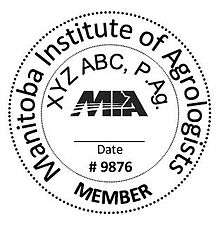Professional agrologist

Professional agrologist (abbreviated P.Ag.) in Canada, also called Certified professional agronomist (abbreviated CPAg) in the United States[1] or agronome (abbreviated agr.) in Québec is a certification for the agrology profession in North America. There are approximately 10,000 professional agrologists and agronomes in Canada[2] registered in 10 provincial institutes of agrology as well as 13,000 Certified professional agronomists in the United States.[1] Agrologists act as consultants to the agricultural sector, using fields such as animal science, food science, genetic engineering, soil science and environmental sciences. Professional agrologists are found providing advice directly to farmers, in communications and financial roles, in the fertilizer and seed business, food processing plants, in turf management and golf course operations as well as in agricultural organizations and corporations.[2]
Role of the agrologist
Agrologists are engaged in a wide variety of agricultural operations as advisors to crop or livestock production. Much of their work is involved in troubleshooting pests or disease in farming operations and determining cultivar choice and pesticide application.[3] Agrologists are also employed by supply companies in order to advise them of the most up to date research and what it means for their products.
Self-regulation and certification
In Canada, professional agrologists are certified through a Self-regulatory organization or SRO. There are 10 such SROs in the country, one in every province. The requirements for certification differ in every province, but generally a prospective is required to have a 4-year Honours degree related to the agricultural sciences and to have completed a 2-year mentorship program, which is an apprenticeship with a certified professional agrologist.[4] An agrologist undergoing their apprenticeship is referred to as either Agrologist-in-training (AIT) or an Articling Agrologist (A.Ag.) depending on the province.
In the United States, the American Society of Agronomy is the SRO responsible for certification. The American Society of Agronomy uses a sliding scale of education and experience to determine certification - it is required to have either a bachelor's degree and 5 years work experience, a master's degree and 3 years work experience, or a Doctorate and a single year of work experience.[1] CPAgs are required to complete at least 50 hours of continuing education through the American Society of Agronomy every 2 years in order to retain their certification.
Certification is a voluntary quality standard everywhere except in the provinces of Alberta, Saskatchewan, Québec and Nova Scotia, where certification with the provincial agrology institute is mandatory in order to practice agrology in that province.[5][6][7]
Alternate certifications
In Manitoba and Ontario, a lesser certification called Technical Agrologist is available, requiring a two-year college or university education in the agricultural sciences instead of a 4-year honours degree.[2][4] Certified technical agrologists take the title T.Ag. and require the same mentorship process as a professional agrologist. Alberta has a similar regulated member designation titled "Registered Technologist in Agrology", (RTAg).[5]
In the United States, the American society of agronomy also provides certifications for "Certified crop advisors" (CCA), nearly identical to their CPAg designation except that it requires only 2 years experience with a bachelor's degree, instead of the regular 5 years.[1] In Canada, "certified crop advisor" is an available certification in the prairie provinces through the Prairie Certified Crop Adviser Board. Unlike P.Ags, Canadian certified crop advisors do not require a university degree. Instead they are required to regularly pass standardized exams and complete continuing education courses to keep their credentials up to date.[3]
See also
- Agronomy
- Agricultural Science
- Agricultural engineering
- Horticulture
- Animal Science
- Botany
- American Society of Agronomy
References
- 1 2 3 4 "What is CPAg Certification?" (PDF). American Society of Agronomy. Retrieved 22 June 2014.
- 1 2 3 "Overview: Ontario Institute of Agrologists". Retrieved 22 June 2014.
- 1 2 "Grow and Learn: Become a Certified Crop Advisor". University of Saskatchewan Centre for Continuing and Distance Education.
- 1 2 "Registration Requirements: Manitoba Institute of Agronomists". Retrieved 22 June 2014.
- 1 2 "Why Designation?". Alberta Institute of Agrologists. Retrieved 22 June 2014.
- ↑ "Qualifications for Membership". Nova Scotia Institute of Agrology. Retrieved 22 June 2014.
- ↑ "The Profession of Agrology". Saskatchewan Institute of Agrologists. Retrieved 22 June 2014.
External links
- American Society of Agronomy
- Agricultural Institute of Canada
- Alberta Institute of Agrologists
- British Columbia Institute of Agrologists
- Manitoba Institute of Agrologists
- New Brunswick Institute of Agrologists
- Newfoundland and Labrador Institutes of Agrologists
- Nova Scotia Institute of Agrologists
- Ontario Institute of Agrologists
- Prince Edward Island Institute of Agrologists
- Saskatchewan Institute of Agrologists
- l'Ordre des Agronomes du Québec